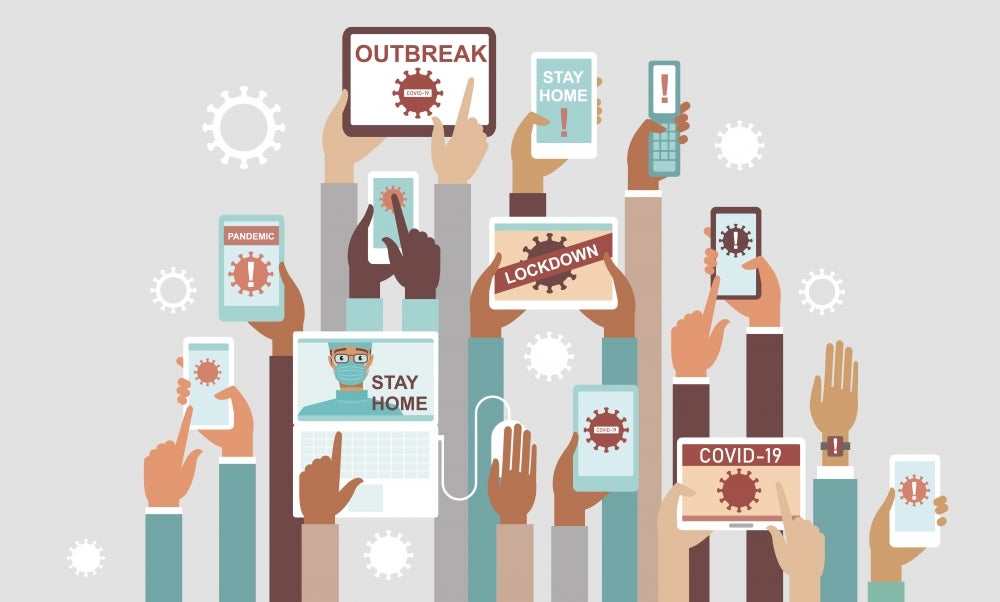
Messages From a Pandemic

The pandemic has upended nearly every aspect of life, from agriculture to zoos, science to religion, individuals to international, and eating to socializing. Thus, says UC Santa Barbara communication scholar Ronald Rice, “The pandemic has heightened our need to understand (among many other things) how all aspects of life are interconnected.”
That need led Rice, the Arthur N. Rupe Professor in the Social Effects of Mass Communication, to devote the 2021 Rupe Biannual Conference to exactly that. The daylong virtual conference, “Communicating about COVID-19,” will be held Thursday, May 6, from 11 a.m. to 6:15 p.m. via Zoom. It is free and open to the public.
“One of the many lenses we may apply to understand the nature, meaning and consequences of this crisis is through communication,” said Rice, convener of the conference. “COVID-19 itself is communicative — it’s contagious, spreading from people to people — but also, as with all social issues, the scientific nature, social meaning, and personal and social responses are all created and spread through communication.”
Public health campaigns, he noted, provide material resources and information — say about symptoms and vaccinations — but they also communicate messages about the disease, prevention and treatment. And, Rice noted, “COVID-19 is also an unfortunate case of how humans can project upon it all sorts of meanings, symbols, conflicts, ideologies, personal concerns, inaccuracies and misinformation.”
“The simple and effective wearing of masks is the poster child for this process,” he said. “Indeed, several of the presentations will talk about not only COVID-19 messaging, but even the symbolic role of wearing or not wearing masks.”
Across five sessions, the conference will bring an array of expert presenters to address a breadth of topics in communication research and practice, considering interpersonal implications of the pandemic; messages about COVID specific to such things as masks, cultural values and blame; the use of media to communicate about COVID and how new coverage varies by regional factors; and the changing meaning of work when some professions are categorized as essential (or not), and how organizations communicate internally with their employees. The keynote session will highlight the role of institutions in public health communication about COVID-19.
“Even the particular lens of this conference, focusing on and clarifying communication aspects of COVID-19, is more of a prism,” Rice said, “revealing a broad spectrum of communicative processes associated with the disease and its implications. This brief conference can only cover a few of those processes.”
Most of the event’s highlighted presenters are UCSB faculty members and graduate students, primarily from the Department of Communication, but several researchers and practitioners from other institutions and organizations will also be featured, including keynote speaker Dr. Van Do-Reynoso, director of the Santa Barbara County Public Health Department. Each session will include a brief introduction, an interactive poll, about 20 minutes for each of three presenters, and about 10 minutes for discussion and Q&A.
To register for the conference and obtain the Zoom link, visit the Shoreline website at http://cglink.me/2dD/r1067279. UCSB students, faculty or staff member can log in using their UCSB Net ID; members of the public should click on “Sign in Below” to register as a guest. Each session will be recorded and made available on the Rupe Conference website at https://www.comm.ucsb.edu/news/annual/arthur-n-rupe.
“We hope to impart a better awareness of the subtle and interconnected ways in which the process of communication, at various levels, is a crucial aspect of understanding some of the social aspects of this profoundly damaging virus,” Rice said of his goal for the conference. “Attendees will learn from topic experts about intriguing and novel ways that humans can and do communicate about COVID-19. They will learn about developing more effective public health communication, managing interpersonal relationships, designing and assessing messages, becoming more aware of how fundamental values are portrayed in the media, and managing organizational responses. We wish to show how researchers and practitioners, especially at UCSB, are engaged in these areas. Finally, we also hope that attendees will just enjoy the great presentations by our awesome group of experts.”



